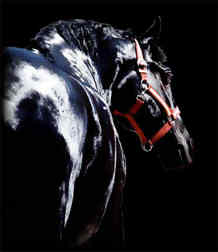
It appears that as in other species stereotypies appear in those horses which have insufficient control over their environment. Frustrations about actives such as feeding, exercising, interacting socially and general lack of an adequate level of stimulation appear to be the major causes of stereotypies in horses. But what has any of this got to do with stabling? The psychological causes of stereotypies are frustration and conflict and can manifest themselves at any age but are most common in young horses especially after weaning, and after sudden environmental changes like being stabled after living out at grass, changes in location or stable mates. It is interesting to know that as with humans, horses with stereotypies are unaware of what they are doing (Cudderford 1995). Once established stereotypies can become dissociated from their initiating causes (McGreevy et al 1995a).
There is a need to define stress and frustration more accurately and refine non-invasive techniques for measuring stress hormones like cortisol. Changing management regimes and reducing stress we can expect improvements in disease resistance and possibly performance. We need to weigh up traditional practices of the owners and evolutionary needs of the horse. We need to re-appraise management practices, especially the way forages are presented, to increase the time a horse eats the forage by making the horse work harder to get forage. We need to increase the social contact between neighbouring horses and have the horse out of box as much as possible. But this in itself, although a step forward is not good enough.
Despite our best intentions, there is still something wrong with the way that we keep horses. We subject horses to live under our rules, but it is time to prevent occurrence of stereotypies in the name of animal welfare (Ödberg 1993). It is worrying to read in Miller (1996) that during an international equine veterinary congress, two of the speakers were advocating "radical surgical procedures to control cribbing", and were of the opinion that "cribbing in general annoys the horse’s handlers more than it harms the offending horses.
It is the authors opinion that there is no reason why a horse should be in a stable. This may be thought to be an extreme opinion until you think logically about the horse’s welfare. We can compete horses from pasture, mares can foal outside with no problem, stallions can be field kept with other horses with no problems of injury and we can learn to adapt to them rather the other way round. The aggression seen towards other horses results from isolation, and the prevention of normal equine social hierarchy (Houpt 1981). We can manage the pasture; we can still put as much effort, time and care into looking after our horses when they are outside and not in. It is healthier emotionally and physically for the horse.
Therefore it has been concluded that the stabling of horses is a welfare issue.